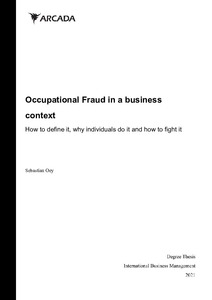Occupational Fraud in a business context - How to define it, why individuals do it and how to fight it
Oey, Sebastian (2021)
Oey, Sebastian
2021
All rights reserved. This publication is copyrighted. You may download, display and print it for Your own personal use. Commercial use is prohibited.
Julkaisun pysyvä osoite on
https://urn.fi/URN:NBN:fi:amk-202105128479
https://urn.fi/URN:NBN:fi:amk-202105128479
Tiivistelmä
In this thesis I will focus on finding out how the academic and business world defines occupational fraud in a business context, why
would anyone according to them want to perpetrate occupational fraud and how occupational fraud can be countered before and
after it has been perpetrated. The main initiator for writing about this topic is that economic crime has significant consequences for the companies and societies where they are perpetrated. Through this thesis I want to shed light on the problem and collect the
most important theories, issues and solutions provided by researchers and professionals about the topic. The chosen research method will be structured literature review, since the sensitivity of the topic makes it more difficult to get first hand data on the topic. The
definition of occupational fraud varies according to what focus the author has, but the definitions have similarities. Why a person would commit occupational fraud is a complex matter since the motivation for committing occupational fraud is a very personal
one, but a person may also become a perpetrator because of mental illness or without any clear motivator. There was a clear indication that the traditional model that focuses on the individual as perpetrator is wrong, since occupational fraud done in collusion with others is clearly more costly and more difficult to track than the ones done by a single individual. The “typical” occupational fraudster is a highly educated middle aged male, but this does not cut out the possibility of other individuals committing the crime since
succeeding in occupational fraud has a lot to do with individual characteristics. It came out very strongly that company culture, management style, clear legislation, systematic and strong whistleblower-programs and segregation of tasks is essential in preventing and finding out about planned or perpetrated occupational fraud.
would anyone according to them want to perpetrate occupational fraud and how occupational fraud can be countered before and
after it has been perpetrated. The main initiator for writing about this topic is that economic crime has significant consequences for the companies and societies where they are perpetrated. Through this thesis I want to shed light on the problem and collect the
most important theories, issues and solutions provided by researchers and professionals about the topic. The chosen research method will be structured literature review, since the sensitivity of the topic makes it more difficult to get first hand data on the topic. The
definition of occupational fraud varies according to what focus the author has, but the definitions have similarities. Why a person would commit occupational fraud is a complex matter since the motivation for committing occupational fraud is a very personal
one, but a person may also become a perpetrator because of mental illness or without any clear motivator. There was a clear indication that the traditional model that focuses on the individual as perpetrator is wrong, since occupational fraud done in collusion with others is clearly more costly and more difficult to track than the ones done by a single individual. The “typical” occupational fraudster is a highly educated middle aged male, but this does not cut out the possibility of other individuals committing the crime since
succeeding in occupational fraud has a lot to do with individual characteristics. It came out very strongly that company culture, management style, clear legislation, systematic and strong whistleblower-programs and segregation of tasks is essential in preventing and finding out about planned or perpetrated occupational fraud.
